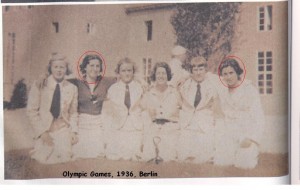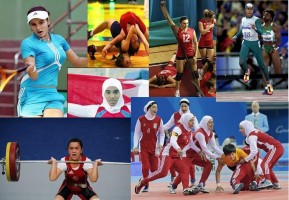By Sertaç SEHLIKOGLU
During 2012 London Olympics, heated debates arose around the question of Muslim women’s participation to Olympics. Some of these discussions problematized the position of countries which have never sent a female Olympian (Brunei, Saudi Arabia and Qatar), while others discussed under which conditions headscarved (hijabi) Olympians should participate in the games. Although they come from very different ideaological, political, and religious perspectives, all these debates and interventions claimed the right to exercise power on the female body. As an activist blogger on Muslim women’s involvement in sports and a young anthropologist, I have been inquiring issues of women’s agency, desire, and privacy in my field research. As I have been interviewing Muslim women doing sports in women-only gyms in Istanbul, I have asked them about their views on involvement in sports, privacy, modesty, and public sexuality.
In order to have a better understanding of the debates on Muslim sportswomen, one needs to keep two points in mind: The first one is the Islamic point that sports requires body movements that trouble the perceptions on women’s public visibility and public sexuality. The second point however is linked to a broader question on the boundaries between the masculine and the feminine; which are perceived to be physically yet discursively trespassed by professional sportswomen, who are therefore considered as troubling subjects.
The literature on sports and gender also emphasizes that women face higher levels of constraints than men regarding involvement in leisure and sports both in Western and in Muslim contexts (Shaw 1994, 1996; Henderson and Bialeschki 1993). While several scholars bring forward the original teachings of Islam which actually favor and advocate physical development sports for both sexes (Mahfoud 2008, Pfitzer 2008), several others criticize the ways in which Muslim women’s involvement in sports are overshadowed and restricted by hegemonic masculine discourses (Di-Capua 2006). Among those discussions, I am interested in whether and how Muslim women have developed strategies to increase and legitimize their involvement in sports both in the Muslim and non-Muslim and/or secular world.
MUSLIM WOMEN AND SPORTS: A CONTESTED AREA
Two female participants of Olympics from Turkey with other fencers, 1936. Image courtesy Sertac Sehlikoglu
We can group Muslim sportswomen into three based on their participation in international games. The first group of women is composed of those who are not following the Islamic dress code, some of whom do not believe that such dress code (ie, headscarf) is Islamic. Historically, this group has been involved in international games for much longer than the other two, since modernists in many Muslim societies viewed sports as a means of breaking women’s segregation and including them in public life in the early 20th century. The first Muslim women attended the 1936 Berlin Olympics: Suat Aşeni and Halet Çambel
represented Turkey in fencing, 36 years after first women were allowed to compete in the Olympic Games. Turkey, as a country which accepts international dress regulations for different branches of sports, does not have any problem in sending its successful sportswomen to the Olympic Games, as long as the sportswomen follow the international dress codes in sports.
The second group of Muslim women is composed of those who believe in modesty and prefer observing Islam in terms of the dress code as well. These women often face other rules, such as those in international games, which forbid their headscarf based on safety and security concerns. Muslim sports activists propose “safe hijabs” to negotiate with security concerns and suggest alternative styles for different branches. FIFA, for instance, was in contact with designers for an approvable headgear to be used in international soccer games when this article was being written.
A third group of Muslim women however, are not allowed to participate in sports, not because of their religious choices or international game regulations, but because of the regulations of their own country. Iranian sportswomen are an example to this, since the branches of sports Iranian women are allowed to participate are limited: Lida Fariman, Manije Kazemi (archery), Marjan Kalhor (skiing), and Sara Khoshjamal Fekri (taekwondo) are four examples, who have represented Iran in the Olympic games in earlier years within clothes regulated by their country. In these Iranian cases, the dress codes of the sport are in line with Iran’s national dress code for modesty to be preserved. Similarly, and unfortunately, there are countries, such as the Southeast Asian nation of Brunei, Saudi Arabia and Qatar, which have not sent any single woman to the Olympic games until 2012. Such outfit regulations influence female citizens of these countries whether the sportwomen themselves are Muslims or not, since they are bounded with the codes both at national and at international level.
What all these groups of Muslim women seem to be sharing is that their bodies are at the center of heated ideological, political, or religious debates and contestations at national and international platforms; as these women are subjected to different forms of idealized discourses and pressures (of secularist and Islamist patriarchies) on multiple fronts.
The fatwas regarding sports are very explanatory in understanding the “Islamic” attitudes. Although Islamic rules do not necessarily pose an obstacle to the participation of women in sports, they can shape the sporting experience of women as gendered subjects. All of the fatwas on Islamic web sites concerning physical exercise begin with the importance of sports for health and encourage individuals to be physically active with reference to hadiths, with minor warnings on violence, fanaticism, or hooliganism. When it comes to women’s involvement in sports, the fatwas start using a more regulative language in details. Almost all of the suggested regulations and rules about women’s involvement in sports are related to gender segregation, and, more importantly, bodily exposure. Fatwas specify several rules that must be followed: First, men and women must be segregated, since mixed environments may open channels for seduction, temptation and corruption. Fatwas reject any physical exercise that stir sexual urge or encourage moral perversion such as women practicing dancing and being watched by the public since each one of the these acts are coded as “sexual(ly appealing).” Indeed, those within Saudi Arabia who oppose the inclusion of women in sports do so because future implications and consequences of women’s involvement in sports might be un-Islamic although there is nothing in Islam that prohibits women from physical activity or even competitive sports.
Most of the time, the most convenient sport for Muslim sportswomen who have concerns about their body movements or Islamic veiling are the branches that do not require too much body movements – the movements which are perceived as ‘sexually appealing’ such as movement of hips (running) and breasts (jumping). The most popular sports for women from predominantly Muslim countries have been athletics, power lifting, fencing, archery, martial arts and table tennis. Such branches are more convenient especially if women are professionals and need to spend hours everyday for training. Women can easily find spaces for training and do not need to seek for special dedicated spaces.
WHAT IS THE BORDER OF VEIL, SEXUALITY AND SPORTS?
Set of photos shown to informants and asked what they think. Image courtesy Sertac Sehlikoglu
The Islamic veiling, whether in the format of a simple headscarf or in more sophisticated outfits, does have a spiritual value for Muslim women as they cover their bodies during prayer. Such a value is too important to underestimate. Yet, the borders of a veiled body also stay on the edge of the gender binary of modern Islamic heterosexual norms. As apparent in the fatwas, less veiled body of a Muslim woman arouses hyper-femininity yet reflects homoerotic boundaries of women in Islamic cultures. However, the body of a Muslim sportswoman is troubling not only because it is sexually arousing as a female body, but also because it trespasses into the masculine zone.
During my field research on women-only gyms in Istanbul, I interviewed 40 women on their involvement in physical exercise and how their involvement is shaped or constrained by people closest to them at home or at work. These women prefer such homosocial spaces simply because they do not feel “comfortable”, as they put it, when they can be seen by men. I showed my informants, who were sporty but not involved in any professional sports, photos of various Muslim sportswomen taken during international games. They were all familiar with physical exercise and accepted Islamic gender norms at one level, therefore preferred homosocial spaces to exercise. The photos women were shown included Sania Mirza (Indian tennis player, non-veiled), Roqaya Al-Gassra (Bahraini Athlete, veiled), female wrestlers, volleyball players, and weightlifters. Amongst all, Al-Gassra aroused the most mixed feelings amongst women. Women did not feel comfortable about Al-Gassra’s look since she “looked like a guy” and she was revealing her body although she was covering her head. On the other hand, most of my veiled informants were proud to see a ‘veiled’ (not a Muslim but veiled) woman in international games but they still found it unnecessary. The Olympics and international games therefore, raise the debate on the ways in which a woman’s body is exposed to international audiences which is linked to complex feelings on national pride (and how this sense of pride and nation is perceived), women’s public sexuality, modesty and Islamic pride (which also takes gendered forms). Indeed, Al-Gassra, as a professional veiled athlete, was becoming part of such Islamic pride and become target of criticisms for two reasons: for her low-veiling and tomboy look. Thus, Islamic pride of a woman is expected to be both normative and modest; both of which are violated in the case of Al-Gassra.













